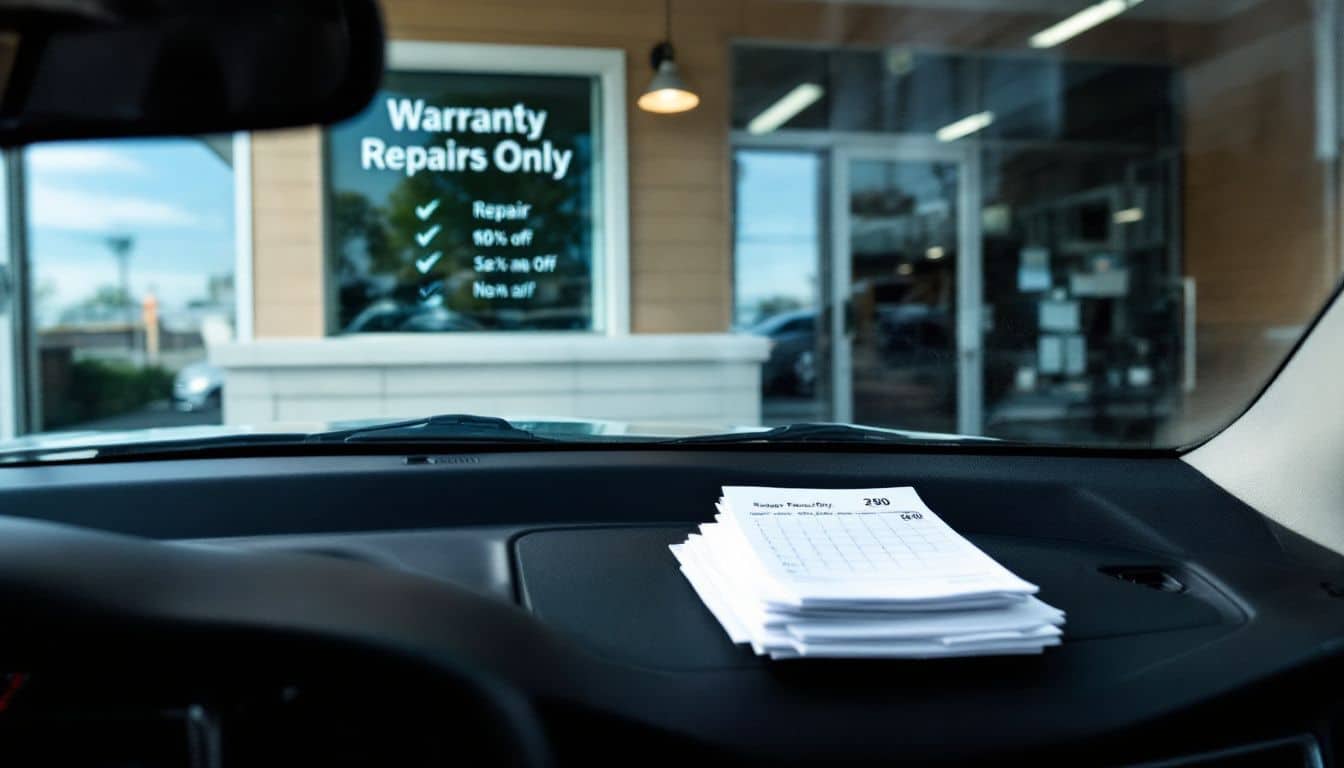Ever bought a car that’s given you nothing but trouble? You might have a lemon on your hands. What does it mean when a car is a lemon, you ask? It’s a vehicle with serious defects that just won’t quit, no matter how many times you fix it.
This post will help you spot the sour signs of a lemon car. Buckle up – it’s time to get savvy!
Key Takeaways
A lemon car is a vehicle with serious defects that persist despite repeated repair attempts. About 1% of cars sold yearly in the U.S. are lemons.
Key signs of a lemon include regular breakdowns, repeated repairs for the same issues, and ongoing unresolved problems that affect safety, value, or use.
Lemon laws protect buyers in all 50 states. They typically require 4 repair attempts or 30 days out of service within the warranty period to qualify.
If your car is a lemon, you may be entitled to a replacement vehicle or refund. Keep detailed records of all repairs and issues to support your claim.
To avoid buying a lemon, research the model thoroughly, get a vehicle history report, have a trusted mechanic inspect it, and conduct a thorough test drive before purchasing.
Table of Contents
Defining a “Lemon” Car

A ‘lemon’ car is a dud on wheels. It’s a vehicle that keeps breaking down, no matter how many times you fix it. These troublesome rides often have serious defects that mess with their safety, value, or usefulness.
About 1% of cars sold each year in the U.S. end up being lemons – that’s a lot of sour deals!
Lemon laws came into play in the 1970s to protect buyers from these automotive nightmares. All 50 states now have these laws. They’re your shield against getting stuck with a car that’s more trouble than it’s worth.
Even used cars in Waco, TX with their original warranty can be lemons if they have persistent issues.
As someone who once got stuck with a lemon, I can tell you it’s no fun.
A lemon car is like a bad boyfriend – it looks good on the outside, but it’s nothing but trouble once you get to know it.
Traits of Lemon Cars

Lemon cars are a real pain in the neck. They break down more often than a cheap watch and cost you an arm and a leg to fix – talk about a money pit!
Regular Breakdowns

Regular breakdowns are a clear sign of a lemon car. You’ve just bought a shiny new ride, but it keeps leaving you stranded. Not cool, right? That’s what happened with the 1993 Mercury Topaz.
It was known for breaking down often, frustrating many owners. If your car spends more time in the shop than on the road, it might be a lemon.
Frequent visits to the mechanic are a warning sign. A good car shouldn’t need major fixes every other week. If you’re on a first-name basis with your repair shop staff, something’s off.
Lemon cars often need the same repairs over and over. It’s like a bad movie on repeat – boring and expensive! Keep an eye out for these patterns. They could save you from a bad deal and a lot of headaches in the future.
Repeated Repairs for Same Problems

Moving from regular breakdowns, let’s talk about another red flag: repeated repairs for the same issue. It’s like having a bad case of déjà vu, but with your car. You take it to the shop, they fix it, and boom – the same problem pops up again.
This isn’t just annoying; it’s a big sign your car might be a lemon.
Think about it – you’re spending time and money fixing the same thing over and over. It’s like trying to patch a leaky boat with duct tape. Sure, it might work for a bit, but the problem keeps coming back.
This often points to a deeper issue that the mechanics just can’t seem to solve. It’s not just about the hassle – it’s about your safety too. A car that keeps having the same problem could leave you stranded… or worse.
If you find yourself on a first-name basis with your mechanic due to repeated visits for the same issue, it might be time to consider the ‘L’ word – Lemon, says Jane Doe, a consumer rights attorney.
Ongoing Unresolved Issues

Repeated repairs can be frustrating, but ongoing issues take things to a whole new level. Imagine taking your car to the shop again and again, only to have the same problem pop up.
It’s like a bad dream that won’t end! These persistent troubles can really put a dent in your wallet. Plus, they eat up your time and patience faster than a hungry teenager at an all-you-can-eat buffet.
Unresolved issues often point to deeper problems with your vehicle. Maybe it’s a faulty engine that just won’t cooperate, no matter how many times it’s fixed. Or it could be a safety feature that keeps acting up, putting you and your loved ones at risk.
These ongoing headaches can seriously hurt your car’s value and usefulness. If your ride is out of commission for a month or more, it might be time to face the sour truth – you could have a lemon on your hands.
Lemon Laws Overview

Lemon laws protect car buyers from faulty vehicles. These rules vary by state but offer hope for folks stuck with a dud. Want to know if your car qualifies? Keep reading!
Federal and State Protections
 Lemon laws pack a punch for car buyers. They’re like a shield against faulty wheels. At the federal level, the Magnuson-Moss Warranty Act has your back. It makes sure carmakers spell out warranties clearly.
Lemon laws pack a punch for car buyers. They’re like a shield against faulty wheels. At the federal level, the Magnuson-Moss Warranty Act has your back. It makes sure carmakers spell out warranties clearly.
Plus, it lets you take legal action if they break their promises. But that’s not all – each state has its own lemon laws too. These local rules often give you more protection than the federal government does.
State lemon laws vary, so it’s good to know your local rules. Some cover used cars, while others don’t. The time and mileage limits can differ too. But here’s the sweet part – most states offer either a replacement car or a refund if yours is a lemon.
It’s like getting a do-over on your car purchase. Just keep in mind, good records are key. Keep all those repair slips and dealer visits logged. They’re your proof if you need to make a claim.
Lemon laws are the consumer’s secret weapon in the battle against defective cars.
Requirements for a Car to Qualify as a Lemon

Now that we’ve covered federal and state protections, let’s dig into what makes a car a lemon. The rules aren’t as sour as you might think, but they’re pretty specific.
- Substantial defect: Your ride must have a major flaw that impacts its safety, value, or use. We’re talking big issues here, not just a wonky radio or squeaky door.
- Warranty period: The problem needs to pop up while the car’s still under warranty. This usually means within the first year or 12,000 miles, whichever comes first.
- Reasonable repair attempts: The dealer or manufacturer should get a fair shot at fixing the issue. Most states say four tries is enough, but it can vary.
- Out of service time: If your car’s in the shop for 30 days or more (not always in a row) for warranty repairs, it might qualify as a lemon.
- Serious safety hazard: Some states have a “two-strikes” rule for safety issues. If it’s a life-threatening problem, two repair attempts may be enough.
- Timely reporting: You’ve got to speak up quickly. Most states require you to file a complaint within six months of your warranty expiring.
- Proper documentation: Keep all your repair receipts and records. Without proof, your case might fall flat.
- Unresolved issue: The problem must still exist after all those repair attempts. If they finally fix it on the fourth try, you’re out of luck.
Rights Under Lemon Laws

Lemon laws give you the right to get a new car or your money back. But there’s more to it… Keep reading to find out how these laws can save you from a sour deal!
Options for Replacement or Refund
Lemon laws offer hope for car buyers stuck with faulty vehicles. Let’s explore your options if you’ve got a sour deal on wheels.
- Full refund: You might get all your money back, including taxes and fees. This option lets you start fresh and pick a new ride.
- Vehicle replacement: The dealer may swap your lemon for a similar, working model. It’s like a do-over without the hassle of shopping again.
- Partial refund: Sometimes, you’ll get some cash back but keep the car. This helps cover repair costs or makes up for the headache.
- Repair attempts: The law often requires dealers to try fixing the problem several times. Keep track of these tries – they’re key to your case.
- Arbitration: Many states offer free dispute resolution. It’s less scary than court and can lead to quicker results.
- Legal action: If talks fail, you can sue. Don’t worry – successful claims often cover lawyer fees.
- Buyback programs: Some carmakers have their own plans to take back lemons. These can be easier than going through the courts.
- Trade-in deals: As a last resort, dealers might offer a good trade-in value. It’s not ideal, but it could get you into a better car fast.
Limits on Coverage Duration and Mileage
While getting a replacement or refund sounds great, there are some limits to keep in mind. Let’s break down the details of coverage duration and mileage restrictions.
| State | Mileage | Warranty Duration |
|---|---|---|
| New Jersey | 24,000 miles or less | 90 days or 3,000 miles |
| New Jersey | 24,000-60,000 miles | 60 days or 2,000 miles |
| New Jersey | Over 60,000 miles | 30 days or 1,000 miles |
| Connecticut | Varies | Based on car price and miles |
As you can see, ladies, the rules aren’t the same for everyone. They change based on where you live and how much your car’s been driven. In New Jersey, for example, a newer car gets more protection. But once it hits 60,000 miles? The warranty gets smaller pretty quickly.
Connecticut does things differently. They adjust the warranty based on both price and mileage. It’s like a recipe – a bit of this, a bit of that.
Here’s a little story from my own experience: When I bought my first used car, I didn’t know about these limits. Boy, was I surprised when my 70,000-mile beauty started acting up after two months! I found out the hard way that older cars have shorter coverage periods.
That $50 deductible I mentioned earlier? That’s for each repair under the “reasonable opportunity to repair” clause. It’s like a small fee every time your car needs fixing.
So, what should a gal do? Keep those receipts, track your miles, and know your rights. It might seem annoying, but trust me – it’s worth it if your new wheels turn out to be a lemon.
Actions to Take with a Suspected Lemon Car

If you think your car’s a lemon, don’t sit back! Take action now. Document every repair, chat with a lawyer, and let the maker know. Want to learn more about handling a sour ride? Keep reading!
Record All Repairs and Issues
Got a car that’s giving you trouble? Start a repair diary ASAP! Jot down every hiccup, from weird noises to full-blown breakdowns. Note the date, mileage, and what the mechanic did.
Keep all receipts and work orders too. This info is gold if you need to prove your car’s a lemon later.
Don’t forget to log your chats with the dealer. Write down who you talked to and what they said. If you had to rent a car while yours was in the shop, save those receipts. All these details build a strong case if you need to fight for your rights.
Trust me, I’ve been there – good records saved my bacon when I had a lemon!
A well-kept repair log is a car owner’s best friend in the fight against lemons.
Consult a Lemon Law Attorney
After you’ve kept track of all repairs, it’s time to talk to a pro. Lemon law attorneys know the ins and outs of these tricky cases. They can look at your records and tell you if you’ve got a strong claim.
Many offer free chats to start, so you won’t lose money just by asking. Plus, if they take your case, they might work on a “no win, no fee” basis. This means you only pay if you win.
It’s a smart move to get expert help early on. These lawyers can guide you through the whole process, from writing letters to the carmaker to going to court if needed. They’ll fight to get you a new car or your money back.
Don’t try to tackle a lemon law case alone – get a pro in your corner!
Notify the Manufacturer
Got a car that’s acting up? Don’t wait – tell the maker right away! Send them a message with all the details on what’s wrong and how many times you’ve had to fix it. I once had a car that kept breaking down on me.
After the third time, I sent an email to the company. I’m so glad I did! They took it seriously and helped me out.
Keep all your paperwork about your car troubles. Emails, repair bills, tow truck receipts – everything. It’s annoying, but believe me, it’ll help if you need to stand up for your rights later.
And don’t hold back when talking to the dealer or car company. Be clear, be firm, but stay calm. You’re just trying to get what you paid for – a car that actually works!
Lemon Law Claims Process

Got a lemon? Time to squeeze out your rights! The claims process can be a bit sour, but it’s worth it to get your car troubles fixed – or get a refund. You’ll need to file paperwork, maybe go through arbitration, and possibly even head to court…
but don’t worry, we’ve got the juice on how to handle it all.
Submitting a Claim
Ready to file a lemon law claim? Let’s get the ball rolling! First, gather all your paperwork – sales docs, repair records, and chats with the dealer. These are your golden tickets.
Next, draft a clear letter to the carmaker. Spell out your car’s issues and what you want them to do about it. Don’t forget to include copies of your docs. Send it all by certified mail – you’ll want proof they got it.
Now, the waiting game begins. The carmaker has a set time to respond – usually about 30 days. They might offer a fix, a new car, or even a refund. If they don’t play ball, it’s time to think about your next move.
Maybe it’s arbitration or even court. But don’t sweat it! A good lemon law attorney can guide you through the process. Speaking of which, let’s chat about the arbitration process….
The Arbitration Process
Arbitration is a quick way to settle Lemon Law cases. It’s less formal than going to court. A neutral person listens to both sides and makes a decision. The carmaker pays for everything, so you don’t have to worry about costs.
It’s like having a referee decide who’s right.
The process is pretty simple. You present your case, and the car company does the same. Then, the arbitrator decides if your car is truly a lemon. If you win, you might get a new car or your money back.
It’s a fair shot at justice without the headache of a long, drawn-out lawsuit.
Legal Actions if Needed
If your lemon car case stalls, legal action might be your next step. You’ve got rights, and sometimes you need to fight for them! I once had a friend who took her carmaker to court after months of frustration.
It wasn’t easy, but she won in the end. Filing a lawsuit can be intimidating, but it’s often the push car companies need to take you seriously. Just keep in mind – in California, you’ve got four years to file your claim.
That’s plenty of time to gather evidence and build a strong case.
Don’t go it alone, though. A good lemon law attorney can be your ace in the hole. They know all the strategies and can help you through the legal process. Plus, many work on a contingent basis – meaning they only get paid if you win.
My friend’s lawyer was a lifesaver, handling all the paperwork and facing off against the car company’s high-powered attorneys. With the right help, you can turn that sour lemon into sweet victory!
Tips to Avoid Purchasing a Lemon Car

Nobody wants to drive home in a lemon. Here’s how to spot trouble before you buy. These tips will save you headaches and cash down the road.
Research the Car Model
Ladies, let’s talk about researching car models. It’s a crucial step to dodge those lemon cars! I’ve been there – hours spent scrolling through reviews and forums. But trust me, it’s worth it.
You’ll uncover common issues, recalls, and real owner experiences. It’s like detective work, but for your future ride.
Don’t just rely on flashy ads or dealership pitches. Dig deeper! Check out consumer reports, car comparison websites, and even social media groups. These sources spill the tea on reliability, fuel economy, and maintenance costs.
Plus, you might discover some cool features you didn’t know about. Who doesn’t love a car with hidden cupholders or a built-in vacuum? Speaking of cool rides, classic cars can be a fun option too if you’re into that vintage vibe.
Obtain the Vehicle History Report
Getting a vehicle history report is a must before buying any used car. It’s like a detective’s file on the car’s past. You’ll see accidents, repairs, and ownership changes. CARFAX is a popular tool for this job.
It spills the beans on a car’s secrets. Bad stuff hiding in a car’s past? The report will likely show it.
Don’t skip this step, ladies! It could save you from buying a lemon. A good report gives you peace of mind. A bad one? It’s a red flag to walk away. Next up, we’ll talk about how to inspect the car with a pro mechanic.
That’s another key move to avoid getting stuck with a dud.
Inspect the Car with a Trusted Mechanic
Don’t buy a pig in a poke! Get a pro to check out that ride before you sign on the dotted line. A good mechanic will spot issues you might miss. They’ll peek under the hood, test the brakes, and give the engine a once-over.
It’s like having a car whisperer on your side.
This check-up can save you from a world of hurt down the road. Think about it – would you rather spend a little now or a lot later? A trusted grease monkey can sniff out problems that could turn your dream car into a nightmare.
They’ll look at the important stuff – engine, transmission, brakes. It’s like getting a crystal ball for your car’s future!
Conduct a Test Drive
After checking the car with a pro, it’s time to hit the road. A test drive is your chance to feel how the car really runs. It’s like trying on shoes – you gotta walk in ’em to know if they fit right.
Take the wheel and listen up. Any weird noises? Pay attention to how it stops, goes, and turns. Does it brake smoothly or jerk? How’s it handle when you speed up or go around corners? These little things can tell you a lot about the car’s health.
Don’t be shy – give it a good spin to spot any red flags before you buy.
People Also Ask
What’s a lemon car, and how can I spot one?
A lemon car is a dud that’s more trouble than it’s worth. Look out for these sour signs: constant breakdowns, weird noises, or a car that spends more time in the shop than on the road. If your ride has a wonky transmission, faulty airbags, or a finicky engine, you might have a lemon on your hands.
Are there laws to protect me if I buy a lemon?
You bet! The used car lemon law and consumer protection laws have got your back. These federal laws help folks who’ve been stuck with a clunker. If you’re in a pickle, reach out to the Better Business Bureau or a lawyer who knows their way around consumer law.
What should I do if I think I’ve bought a lemon?
First, don’t panic. Document everything – every repair, every weird sound, every time the car leaves you stranded. Keep all your receipts and paperwork. Then, talk to the dealer or manufacturer. If they won’t play ball, it might be time to look into mediation or legal action.
Can I return a leased car if it’s a lemon?
Leasing a lemon? Tough break. Check your lease agreement carefully. Some contracts have clauses for this situation. You might be able to work something out with the lessor. If not, you could be on the hook until the lease is up. It’s a sticky situation, so get some expert advice.
How can I avoid buying a lemon in the first place?
Do your homework! Research the car’s history, get a mechanic to check it out, and take it for a spin. Look for red flags like a salvage title or signs of a “cut and shut” job. Don’t forget to check for recalls or technical service bulletins (TSBs) from the National Highway Traffic Safety Administration.
What about extended warranties? Can they help with a lemon?
Extended warranties can be a lifesaver, but they’re not a cure-all. They might cover some repairs, but they won’t fix a truly sour situation. Read the fine print carefully. Some warranties exclude certain parts like the clutch or timing belt. And remember, a good warranty is no substitute for a reliable car.
References
https://www.timothyabeel.com/blog/what-is-a-lemon-car/ (2023-10-25)
https://www.chase.com/personal/auto/education/buying/lemon-law
https://www.ridewithloop.com/blog/understanding-lemon-cars (2023-09-15)
https://www.lemonlawminnesota.com/blog/2023/09/recognizing-the-signs-that-your-new-car-is-a-lemon/
https://community.cartalk.com/t/understanding-lemon-cars-how-do-they-happen/89510
https://streets.mn/2018/05/11/how-to-tell-if-your-car-is-a-lemon/ (2018-05-11)
https://www.debt.com/auto/lemon-law/ (2021-10-14)
https://www.kbb.com/car-advice/vehicle-lemon-laws-by-state/
http://www.txdmv.gov/motorists/consumer-protection/lemon-law
https://www.cga.ct.gov/2005/rpt/2005-r-0871.htm (2005-11-30)
https://sierralitigation.com/2024/10/12/common-signs-your-car-might-be-a-lemon/
https://normantaylor.com/lemon-law/what-qualifies-as-a-lemon/
https://thelemonpros.com/how-do-i-know-if-i-have-a-lemon/ (2024-07-12)
https://www.lemonlaw123.com/your-guide-to-lemon-law-claims-step-by-step-instructions/
https://www.allenstewart.com/lemon-law-arbitration-process-an-in-depth-look/
https://www.toyotaofclermont.com/blog/8-used-car-warning-signs-dont-buy-a-lemon/
https://bbackcarcare.com/2023/11/27/7-used-car-buying-tips-to-avoid-a-lemon/ (2023-11-27)
